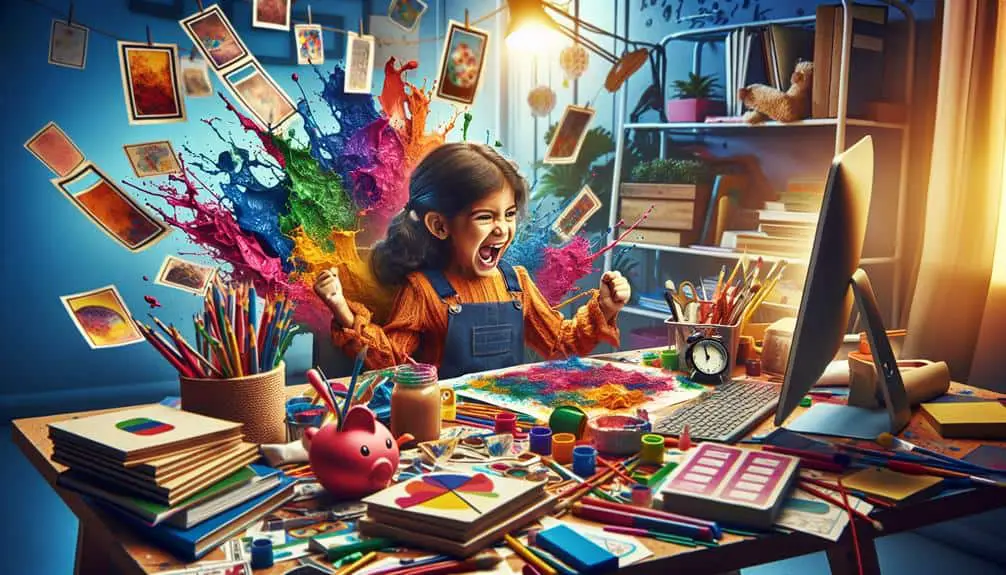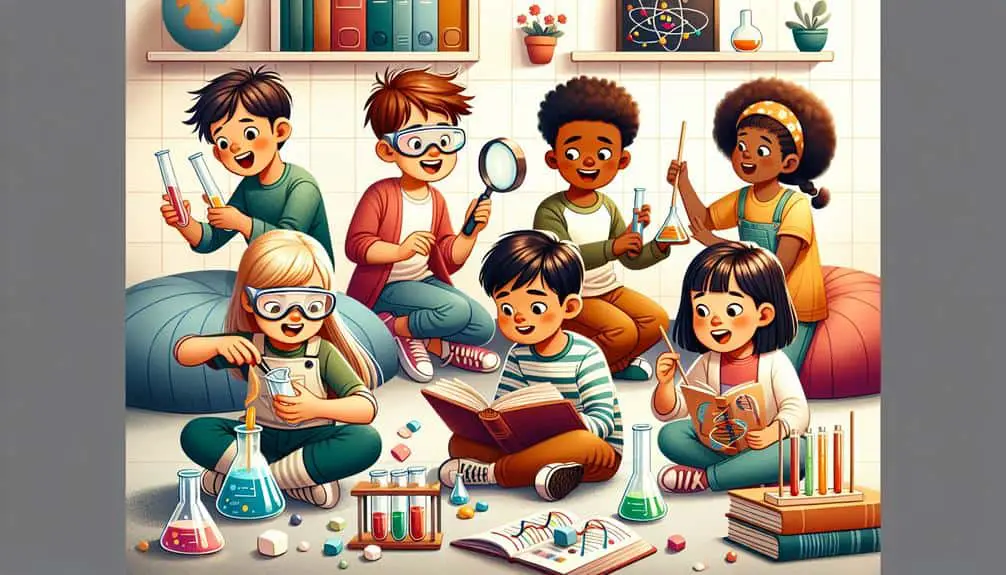When selecting an unschooling curriculum, focus on your child's passions for a personalized educational journey. Embrace flexibility for self-directed learning and vital thinking. Integrate real-world experiences through hands-on activities and field trips. Explore nature to enhance creativity and problem-solving skills. Encourage independent exploration to instill a love for learning. Foster imagination with artistic expression and sensory play. Evaluate progress regularly to adapt and cater to individual needs effectively. Each tip plays a vital role in crafting a unique educational path for your child's growth and development. More insights ahead on enhancing your unschooling curriculum selection.
Key Points
- Tailor curriculum to child's interests for engaging learning experiences.
- Encourage independent exploration and self-directed learning.
- Integrate real-life experiences for practical application of knowledge.
- Provide resources and materials for diverse learning opportunities.
- Continuously evaluate and adapt curriculum to fit child's needs and interests.
Consider Childs Interests
When selecting a curriculum for unschooling, consider your child's interests as the primary guiding factor in shaping their educational journey. Unschooling is a child-led and exploration-based approach to education, allowing children to learn through their interests and experiences rather than a structured curriculum. By focusing on your child's interests, you can tailor their learning experience to be engaging, relevant, and personalized.
Children are naturally curious and enthusiastic to explore the world around them. By incorporating their interests into their educational journey, you can foster a love for learning that will last a lifetime. Whether your child is fascinated by dinosaurs, space, art, or animals, you can use these interests as a foundation for their education. Encouraging exploration based on what excites them not only makes learning more enjoyable but also more effective.
Remember that each child is unique, and their interests will evolve over time. Stay attuned to your child's changing passions and adjust their educational path accordingly. By embracing your child's interests and allowing them to take the lead in their learning, you can create a rich and fulfilling educational experience.
Embrace Flexibility in Learning
When considering how to embrace flexibility in learning, it's important to adopt flexible learning approaches that cater to your child's unique needs and pace.
By personalized learning experiences, you can tailor the educational journey to suit your child's interests, strengths, and learning style.
This adaptability fosters a more engaging and effective learning environment for your child.
Flexible Learning Approaches
Embracing flexibility in learning allows for personalized education tailored to individual needs and interests. By exploring passions and encouraging self-directed learning, unschooling embraces a dynamic approach to education. Flexible learning approaches enable you to explore deeply into subjects that spark curiosity, fostering a love for learning.
Whether it's immersing into astronomy, learning a new language, or experimenting with coding, the freedom to choose what and how you learn can lead to a more engaging educational experience. This approach fosters independence, critical thinking, and problem-solving skills as you navigate through various topics at your own pace.
Embracing flexibility in learning empowers you to take control of your educational journey and make the most out of your learning experiences.
Personalized Learning Experiences
To fully benefit from the flexible learning approaches discussed previously, it's imperative to embrace personalized learning experiences that cater to individual needs and interests. Individualized pacing allows for a tailored approach, ensuring that each learner progresses at a comfortable speed.
Utilizing interactive resources enhances engagement and promotes active participation in the learning process. Customized curriculum further personalizes the educational journey, aligning content with the student's specific interests and strengths.
Hands-on activities provide a practical application of knowledge, reinforcing concepts in a tangible way. By incorporating these elements into your unschooling curriculum selection, you create a dynamic and effective learning environment that fosters growth and development based on individualized needs and preferences.
Utilize Real-Life Experiences
Consider incorporating everyday experiences into your unschooling curriculum to provide authentic learning opportunities for your child. Hands-on learning through real-life experiences can be incredibly beneficial. Field trips to local museums, parks, businesses, or even grocery stores can offer practical lessons that textbooks can't always provide.
For example, a trip to the farmer's market can teach your child about economics, agriculture, and healthy eating habits all in one go.
When utilizing real-life experiences, encourage your child to ask questions, observe their surroundings, and engage with the environment. Whether it's a visit to a historical site, a science experiment in the kitchen, or even a walk in the neighborhood, these experiences can spark curiosity and make learning more meaningful.
Incorporate Nature and Outdoors
When incorporating nature and the outdoors into your unschooling curriculum, you open up a world of outdoor learning benefits. Nature exploration activities can provide hands-on experiences that foster a deeper connection with the environment.
Consider setting up an outdoor classroom to create a dynamic learning space that enhances engagement and curiosity.
Outdoor Learning Benefits
Engaging with the natural environment fosters curiosity and enhances cognitive development in unschooling curriculum selection. Nature immersion and sensory play provide rich experiences that stimulate the mind and senses. Outdoor adventures offer hands-on learning opportunities that can deepen understanding and spark creativity.
Here are five benefits of outdoor learning for unschooling curriculum selection:
- Enhanced Creativity: Outdoor settings inspire imaginative thinking.
- Improved Focus and Attention: Nature's calming effect can help increase concentration.
- Physical Health: Outdoor activities promote exercise and well-being.
- Critical Thinking Skills: Problem-solving in natural environments enhances cognitive abilities.
- Emotional Well-being: Connecting with nature can reduce stress and improve mood.
Nature Exploration Activities
Exploring nature through hands-on activities and outdoor adventures is essential for enriching unschooling curriculum selection.
Nature journaling allows you to document observations, sketches, and thoughts about the natural world, fostering a deeper connection with the environment.
Encourage wildlife tracking to teach about animal behavior and habitats, honing observational skills while learning about local ecosystems.
These activities provide practical learning experiences, promoting curiosity and a sense of wonder in learners.
By immersing yourself in nature, you can inspire creativity, critical thinking, and environmental awareness.
Incorporating nature exploration activities into your unschooling curriculum not only diversifies learning but also instills a profound appreciation for the world around us.
Embrace the outdoors as your classroom and let nature be your teacher.
Outdoor Classroom Setup
To enhance your unschooling curriculum with a focus on nature, consider setting up an outdoor classroom that integrates the natural environment seamlessly into your learning space. Outdoor learning provides hands-on experiences that can deepen understanding and appreciation for the world around us.
Here are five tips to help you establish your outdoor classroom effectively:
- Create designated learning zones for different subjects.
- Utilize natural materials like rocks, leaves, and branches for activities.
- Incorporate seating options like tree stumps or blankets for a cozy atmosphere.
- Guarantee there's access to shade and shelter for all-weather learning.
- Encourage exploration and curiosity with magnifying glasses, binoculars, and journals for observations.
Encourage Independent Exploration
Encouraging independent exploration in unschooling fosters a sense of curiosity and self-directed learning in students. By incorporating hands-on activities and promoting curiosity-driven learning, you empower students to take charge of their education. Self-directed learning and independent thinking are key components of unschooling, allowing students to explore topics that interest them deeply.
Encouraging independent exploration can be achieved through providing a variety of resources such as books, educational websites, and access to different learning materials.
Allowing students the freedom to choose what they want to learn and how they want to learn it nurtures a sense of responsibility and ownership over their education. This approach fosters a love for learning and helps students develop critical thinking skills. When students engage in independent exploration, they're more likely to retain information and apply it to real-world situations.
Foster Creativity and Imagination
Fostering creativity and imagination in unschooling involves nurturing a student's innate ability to think innovatively and envision new possibilities. To cultivate these essential skills, consider the following strategies:
- Encourage Artistic Expression: Provide ample opportunities for drawing, painting, sculpting, or any other form of creative outlet to stimulate imagination.
- Engage in Sensory Play: Incorporate activities that involve exploring different textures, scents, tastes, and sounds to spark creativity through sensory experiences.
- Facilitate Imagination Exploration: Encourage storytelling, role-playing, and pretend play to help children investigate into the domains of fantasy and make-believe.
- Promote Hands-On Activities: Engage in experiments, building projects, and other hands-on tasks to foster creativity through tangible experiences.
- Embrace Unstructured Play: Allow time for free play where children can follow their interests, experiment, and create without constraints to spark their imagination.
Evaluate Progress and Adjust
Evaluating the progress and adjusting strategies are crucial aspects of guiding the unschooling journey effectively. Reflective assessment allows you to gauge your child's development and learning outcomes. Continuous monitoring helps you identify what's working well and what may need adjustment in your unschooling approach. Keep track of your child's interests, strengths, and areas that may require more attention.
Adaptability in curriculum is key to unschooling success. If you notice that a particular subject or method isn't resonating with your child, be flexible in making changes. Curriculum adjustment should be a fluid process, tailored to your child's individual needs and learning style. Don't be afraid to experiment with different resources and approaches to keep the learning experience engaging and effective.



